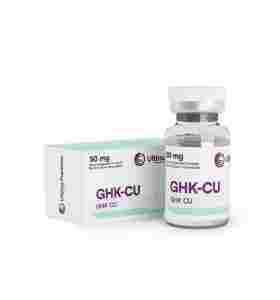Buy GHK-Cu Peptide Online – Skin Repair & Anti-Aging | Lab-Verified
GHK‑Cu (Copper Peptide): Nature’s Regenerative Peptide
What It Is
GHK‑Cu (glycyl‑L‑histidyl‑L‑lysine‑copper) is a small, naturally occurring tripeptide that binds copper ions. It was first identified in human plasma and is prevalent in tissues like skin, saliva, and urine. Levels decline with age—dropping from about 200 ng/mL at age 20 to around 80 ng/mL by age 60 (Vikipedi).
How It Works
Delivers copper safely to cells, enabling enzymatic processes essential for skin repair and collagen formation (The Sun).
Stimulates collagen, elastin, and glycosaminoglycan production, supporting tissue integrity and firmness (PMC).
Promotes wound healing and angiogenesis, accelerating repair in skin, tendon, and gut tissues—animal studies show improved healing even under cortisone suppression (PMC, Vikipedi).
Acts as antioxidant and anti-inflammatory, reducing tissue damage and chronic skin inflammation (Swolverine).
Modulates gene expression, potentially reversing age-related changes in cellular function (Vikipedi, Vikipedi).
Potential Benefits
Improved Skin Quality
Clinical trials show reduced wrinkles, increased skin density and elasticity, and more even tone after 12 weeks of topical use (PMC, Byrdie).
Generates visible improvements in thin vs. thick skin and reduces pigmentation spots (Swolverine).
Accelerated Healing
Enhances wound closure and tissue regeneration in animal models, including in cortisone-treated subjects (PMC).
Hair Growth Potential
Promotes scalp blood flow, follicular cell stimulation, and prolongs the hair growth phase (anagen), although human studies are still limited (freemanmedicalclinic.com).
Anti-Inflammatory & Antioxidant Effects
Suppresses pro-inflammatory cytokines and protects against cellular oxidative stress, aiding in conditions like eczema and rosacea (Vikipedi).
Risks & Side Effects
Skin irritation (redness, itching, stinging) is common with topical use; patch testing is recommended (salhabpharmacy.com).
Injection site reactions, including swelling and mild pain, may occur with injectable forms (Evolve).
Rare systemic effects may include headache, dizziness, fatigue, nausea, and potential blood pressure alterations (Evolve).
Copper toxicity is extremely unlikely when used topically, but ingestion or excessive systemic use could pose risk (salhabpharmacy.com, Minimalist).
Suggested Usage & Dosage
Topical formulations: serums, creams, or lotions are commonly applied once or twice daily; concentrations vary—start low and patch test.
Injectable protocols: typically 1–5 mg per week, divided over injections (though these are largely experimental and not recommended without professional guidance) (Neurogan Health).
Oral supplements: less common, with unclear efficacy and greater absorption variability.
Summary
GHK‑Cu is a powerful peptide with a broad range of regenerative effects—on skin, wound healing, hair growth, and inflammation. Supported by both clinical and preclinical data, it's well tolerated when used correctly. Topical use is safe and effective for improving skin health. Systemic use (injectable or oral) shows promise but is experimental and carries higher risk.

























